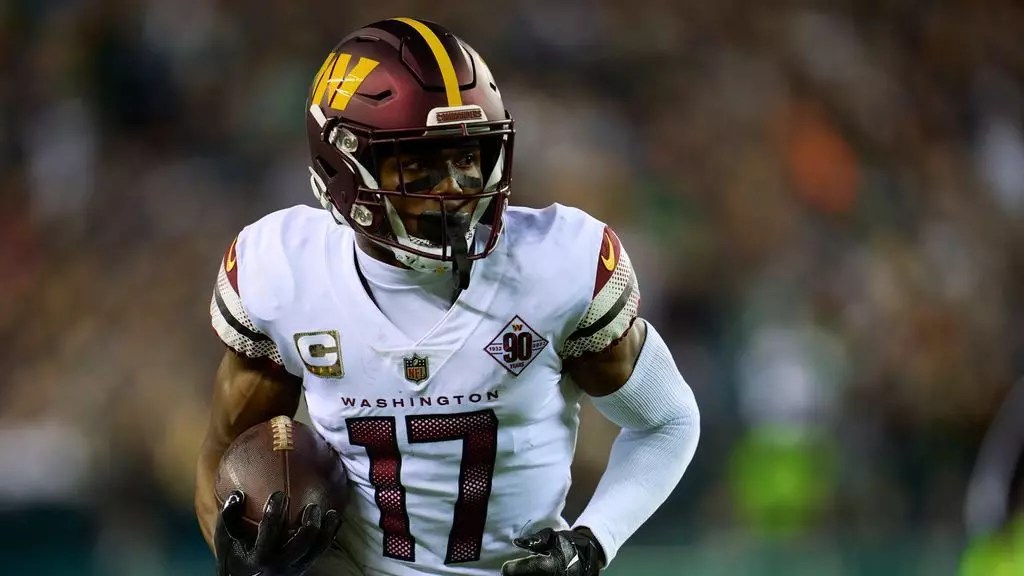In the high-stakes chaos of the NFL, the narrative of team cohesion often masks a deeper malaise—players as commodities, struggles as mere negotiations, and loyalty as a fading ideal. When star receiver Terry McLaurin publicly requests a trade amid ongoing contract talks, it exposes not just a contractual disagreement, but a disturbing shift in what professional sports symbolize. The magic of sport—its ability to forge bonds, inspire communities, and create heroes—often gives way to a ruthless marketplace where individual ambition and financial leverage threaten to erode any semblance of collective purpose. McLaurin’s demand, cloaked in professionalism but fueled by a desire for recognition and financial security, underscores how far the league has strayed from the ideal of mutual sacrifice that once defined team sports.
The Business over Brotherhood: A Deteriorating Culture
Despite Washington Commanders coach Dan Quinn’s attempts to minimize the trade request as a “normal part of NFL business,” the reality speaks otherwise. This isn’t just routine; it is symptomatic of a deeper cultural shift where personal brand and economic security increasingly compete with team loyalty. Quinn’s assertion that players are more aware of contracts reflects a troubling acceptance—that relationships are transactional, and aspirations are secondary to lucrative negotiations. The game’s essence is being diluted, replaced by a cold calculation that measure players’ worth in dollars, often at the expense of the intangibles that make sports inspiring. The locker room, once an arena of camaraderie, now risks becoming a marketplace of unmet expectations and fractured trust.
The Price of Personal Ambition in a Cutthroat League
McLaurin’s case reveals the perils of modern player empowerment. His refusal to accept Washington’s offers, driven partly by comparisons to younger, equally talented receivers such as DK Metcalf, demonstrates the extent to which players are now deeply entangled in the economics of their craft. Yet, this pursuit of every dollar—especially as they approach the later stages of their careers—can erode the very qualities that built their reputation: humility, team orientation, and resilience. McLaurin’s status as a fan favorite and a decorated receiver cannot fully shield him from the realities of a league that values market value over loyalty. The tension between personal ambition and team commitment raises profound questions about the soul of sports and whether it can survive the relentless pursuit of wealth.
The Power Dynamics at Play
While Quinn dismisses the situation as part of the “normal business,” it subtly reveals the shifting power dynamics within the league. Players are no longer just employees; they are entrepreneurs, influencers, and brands in their own right. Negotiations, especially for elite players like McLaurin, often become battlegrounds where leverage, age, and market trends intertwine. The Washington franchise’s reluctance to pay top dollar to a receiver nearing 30 reflects a broader tendency among teams to undervalue veteran talent, pushing players to the brink of desperation. This imbalance underscores a fundamental question: in an industry driven by money and metrics, who truly holds the power—the player or the franchise?
The Human Cost of a Business-First Approach
Beneath the headlines and contract figures lies the heartbreaking reality of what these choices mean for individuals. McLaurin, despite his professionalism and impact on the field, is essentially caught in a contractual tug-of-war that tests his resilience and loyalty. His engagement in team activities—rehabbing an ankle, signing autographs, attending meetings—is a testament to his dedication. Yet, the emotional toll of such disputes is often overlooked. For athletes like McLaurin, the quest for financial security and respect can threaten their identity and mental well-being, raising uncomfortable questions about whether the sport they love is becoming more about business than about competition or human connection.

